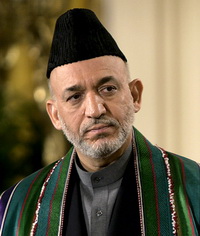Decision on Afghan Strategy to Be Taken as Karzai Is Declared Winner
President Obama has no more excuses to put off a decision on whether to send more troops to Afghanistan, House Minority Leader John Boehner said Monday after Afghan President Hamid Karzai was declared the winner of his nation's presidential election by default.

Obama administration officials had suggested that a decision on American troop levels should be withheld until Afghanistan's runoff election was over. But now that Karzai's challenger, Abdullah Abdullah, has dropped out of the race and handed the election over to Karzai for another five-year term, lawmakers are urging the U.S. president to finalize his overhaul of America's war strategy.
"Now that it is clear that President Karzai will remain in office, the White House has no further pretext for delaying the decision on giving General McChrystal the resources he needs to achieve our goals in Afghanistan," Boehner said in a statement Monday. "There are no more excuses."
Though a fizzled runoff in Afghanistan was not the outcome the White House wanted, administration officials held to their slow-and-steady approach to reviewing war policy when questioned about Abdullah's exit on Sunday. Senior Adviser David Axelrod said Obama would make a decision "within weeks," and White House press secretary Robert Gibbs said Monday that a strategy decision will be made in the "coming weeks," FOXNews reports.
Meanwhile, McChrystal is a consequential figure. He is one of the pioneers of counterterrorism and a highly intelligent, reliable, and well regarded general. His standing in the Pentagon and NATO and his professional reputation are on the line.
After all, McChrystal is the top military officer Obama dispatched to assess the Afghan situation on the ground. Having found a dangerously deteriorating situation, McChrystal, as instructed, proposed a strategy up through the chain of command to the White House that he concluded has the best chance of staving off defeat in what Obama has called a “war of necessity.” McChrystal wants to pursue a counterinsurgency strategy that focuses on protecting civilians, winning over cities and building infrastructure -- a strategy that calls for more manpower on top of the 68,000 U.S. troops already there and a much longer time horizon.
McChrystal has made it clear that he does not support the more limited campaign pushed by Vice President Biden that stresses a counterterrorism effort against Al Qaeda along the Pakistani border with missiles and drones, The Washington Post reports.
It was also reported, Obama aides support the broad outlines of McChrystal's recommendations, but there has been intense internal debate over whether the additional U.S. troops are necessary.
Thomas Gouttierre, who runs the Center for Afghanistan Studies at the University of Nebraska at Omaha, notes that the Afghan people are also watching this policy review closely.
"People in Afghanistan are still concerned whether or not the United States is going to be a consistent, reliable partner," says Gouttierre, who recently returned from a visit to Afghanistan. "They are investing their lives." NPR reports.
Subscribe to Pravda.Ru Telegram channel, Facebook, RSS!





